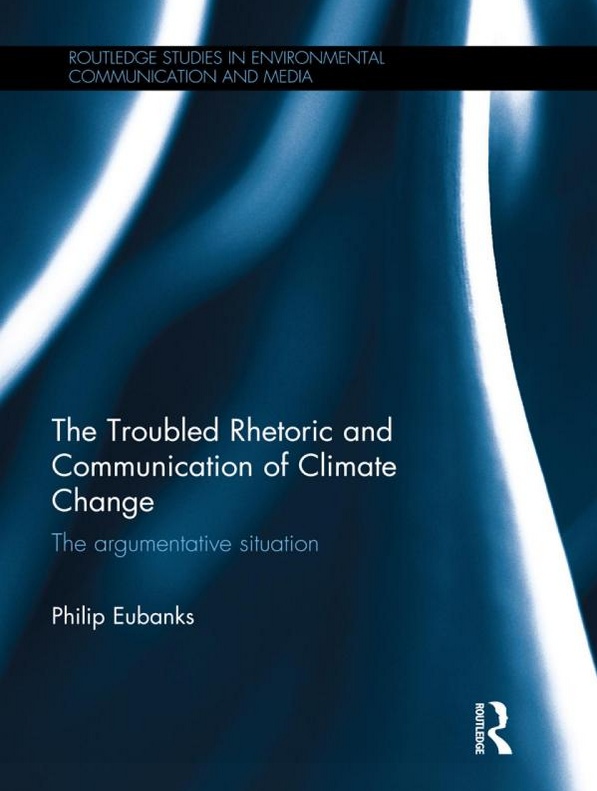Book Review "The Troubled Rhetoric and Communication of Climate Change"
For the summer period I'll be posting a number of book reviews on Climate-Eval. This week, two books ended up on my desk, begging to be read. The first one being Philip Eubanks' book titled The Troubled Rhetoric and Communication of Climate Change: The argumentative situation
The second book, edited by Lorraine Whitmarsch, SSaffron O'Neill and Irene Lorenzoni, and titled Engaging the Public with climate Change: Behaviour Change and Communication will be reviewed in the weeks to come.
 Philip Eubanks, a professor of English, starts off with calling the current climate debate a "dismal case study in the failure of win-lose argumentation", though at the same time acknowledging that science in itself "so successfully conceals its vagaries within apparently objective language and procedures."
Philip Eubanks, a professor of English, starts off with calling the current climate debate a "dismal case study in the failure of win-lose argumentation", though at the same time acknowledging that science in itself "so successfully conceals its vagaries within apparently objective language and procedures."
The first chapter points towards a number of failures in the way we argue and engage in the climate change debate. Public arguments are often about winning-at-all-cost, while argumentation does not have to be a contest in which one person's gain is another person's loss. Moreover, public arguments are often presented as two-sided – terrorists vs. the civilized world, the 'silent majority' vs. the 'radical left' – while in practice reality is not as polarized as the discussion about this reality. A polarized political and media landscape has now resulted in an environment where no lie is too extreme to make an argumentative point, and an argumentative win often coincides with a loss in objective information provision.
And will you win the climate change debate if you convince an opponent of changing his/her mind? It hardly happens that opponents change their mind. Climate denial is a lot like intelligent design; it is based on weak or fake science, with personal beliefs and hard science being put on an equal plane.
The focus of the debate should not be on the opponent, but on swaying the public at large. Avoiding the argument is not an option, but keep in mind that onlookers who need convincing cannot always distinguish a sound argument from (personal) beliefs, or a lie.
This gets us to an interesting discussion on doubt and reasoning in chapters four and five. Eubank states that "once science leaves the safety of academic journals and enters the public sphere, it swims in the same sea with other public discourse." And in that sea of information where does selective self-representation end, and bullshitting start? At what moment does a peer reviewed article simplify a study's reality to the point of misrepresenting the study it reports on? Isn't part of scientific progress the correction of past mistakes, at a previous point in time seen as progress? What about the decline effect in large samples, or the reluctance of scientific journals to publish studies that contradict established ideas? We agree that what matters is scientific rigor, but it is difficult to see (especially in the public domain) which scientific claims are sound.
What makes the situation a little more complex is that the climate scientist – climate skeptic relation is very much comparable to that of a prosecutor and defense lawyer. The scientist has to present a positive case that can withstand reasonable doubt, while the skeptic only has to cast doubt on the scientist's claims.
But when both depart from the same evidence base, Eubanks wonders whether skeptics "deliberately place their grandchildren in the path of worldwide cataclysm for the sake of political loyalty or short-term greed." An analogy with studies on the NASA Challenger disaster seems to be in place, where two social groups (engineers vs. managers) evaluated the same evidence rather differently, to the extent that they simply could not see each other's points. And there are other forces at play; geographic sorting, selective exposure to information, differences in moral foundations and a ‘strict father' model with entrenched (and archaic) gender roles when approaching the nation as a family.
Familiar names from both sides of the aisle – James Lovelock, Al Gore, David Orr, WSJ editorial staff, Brian Sussman, Senator James Inhofe – pass the revue in chapter seven, showing even more so how polarized the climate debate has become. Eubanks wonders whether "climate skeptics and deniers justify their greed by appealing to bedrock conservative values, or whether those bedrock values lead them to champion causes – like energy from coal and oil – that are easily mistaken for greed."
Through discussions on attention, ridicule and the power of imagery we end up in chapter ten with the big question; "How should we argue?" And this is perhaps where Eubanks contradicts himself when saying that, given the size of the issues at hand "we are well justified in imputing moral shame to those who doggedly take the other side." By doing so Eubanks seems to take a two-sides-only approach in which moral shame tends to further polarize the situation.
Also comparing climate change arguments to speaking out against slavery, apartheid and genocide is a bridge too far, and perhaps not relevant to the question at hand. I do see the need to speak out and appreciate the importance of the topic. I do clearly see and agree with the climate justice component. Climate change can influence existing power dynamics and may cause conflicts or further exacerbate existing conflicts in relation to access to resources. But treating a climate change discussion as speaking out against genocide? When speaking out against genocide you are often not reasoning with those who commit acts of genocide, but with those who can stop them. The potentially intervening party in a genocide debate is in essence open to the message of intervention, the perpetrator is not.
My conclusion is that the fissures between climate scientists and climate skeptics (or the differences between liberals and conservatives) in the US are deeper, their viewpoints more entrenched and more resilient to change than anywhere else in the world, further supported by the highly polarized political and media landscape.
There certainly is a fair way to frame an argument, and Eubanks does a good job explaining the intricacies of how to frame climate change in an argument. My second question would then be, "Is there a fair environment to have a discussion departing from a well-framed climate argument?" and the answer would probably be, "Not in the US."
Perhaps I am too negative. Perhaps the current state of the US climate debate departs from the US brand of capitalism, which has rougher edges and is less social than that of other democracies. Perhaps it is fueled by the US' inevitable relative decline in role influence as a world economic power. My aim would be to have a sensible debate with those who are open to it, which might often be non-US climate skeptics and those in the general public who are still developing their frame of reference towards climate change. And that is perhaps where Mr. Eubanks' link to the genocide debate makes sense; talk with those who are open to reason.
The Troubled Rhetoric and Communication of Climate Change: The argumentative situation,by Philip Eubanks is a pleasant read, provides a wealth of resources and makes sensible connections between them. I appreciate the 'note to self' at the end of chapter three: "When you try to save the world, not everyone is grateful."



